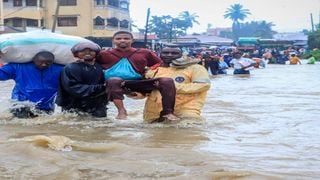
Pedestrians cross a flooded street following heavy rains at Kiembeni in Mombasa on November 17, 2023.
| AFPOur Columnists
Premium
The floods that fear no gods
As of Sunday, severe flooding had killed almost 200 people, at least 76 of them Kenyans, and displaced over 700,000 in Kenya and Somalia as El Nino-induced rainfall continues to wreak havoc on parts of East Africa.
Widespread flooding has affected 33 of Kenya’s 47 counties with those in its northern and eastern parts the worst-hit. Over 17,600 acres of farmland have been destroyed and more than13,400 livestock deaths reported.
Many roads and bridges have been washed away or partially destroyed, making it difficult to reach people marooned by flood waters—or to escape to the hilltops. The government in Nairobi has urged people living in flood-prone areas to relocate to higher ground.
Most of the worst affected areas in Kenya and Somalia, and Ethiopia, were only slowly emerging from a devastating drought that left millions hungry.
The drought was the worst in over a generation. So, they have jumped from hellfire into deadly waters. Normalcy is a word that could soon disappear from their vocabulary.
The shocking flood scenes, and terrified people fighting to get to safety by all means, tell a story that will unfold fully in a few years.
Droughts, floods and other environmental catastrophes are poised to change Kenya, East Africa and the world in ways the plans of men and women wouldn’t have in a relatively short period.
In the past 10 years, devastating floods brought on by cyclones in Mozambique, and also Malawi and Zimbabwe, shattered traditions some patriarchal societies in Southern Africa had held dear—like women shouldn’t climb trees, or swim.
These societies had also privileged men as “defenders”, harking back to an era where the enemy was a warrior army from over the hills or a neighbouring rival chiefdom. If not, wild animals emerging from the forest. The brave men would thus wield their spears and shields against these adversaries as the women hid in trenches or ran off into the hills.
Floods—and droughts—have, however, turned out to be foes men couldn’t defend against. They could not save their family even if they were adept swimmers. In the end, all scrambled for the hills, rooftops of high buildings, or up tall trees.
The women were hardest hit because, in Mozambique, for example, many couldn’t climb trees or swim and get to a rooftop. And those who made it to the trees—both men and women—ran into a new problem: With the indigenous trees long-replaced in urban and peri-urban areas by alien species, their trunks were simply too slippery to climb in the wet.
Women leadership
Power will have to be re-arranged, and the props of patriarchy, like forbidding women to swim in the local river because the gods will be angry, will have to end—and are already ending. In countries like Malawi, there has been a big shift towards women leadership in new ways of working the land in climate change-disrupted times, because they have gained a lot more knowledge from long toil in the fields, as the men are away playing cards with their buddies in the village squares.
From Mombasa and Somalia, we have seen women in religious robes and veils flopping frantically in the water, weighed down by their dress. In droughts, we have seen women from cultures that drape them in mounds of cloth in the name of piety squatting and baking in the heat as they wait for emergency rations. These will have to give.
We are likely to witness a lot of turbulence in the spiritual realm. African gods and deities mostly fall into seven broad categories.
There are gods of creation, who brought various African peoples to this Earth. But the most vexing and among the most sought-after are the gods of fertility: The ones that bestow twins and triplets and lead us to good wives and trustworthy husbands.
They are closely related to the gods of wealth and good fortune—the ones who bring rain, give us dominion over rivers and their fishes, grant us good harvests, lucrative government tenders, aid our children to pass the Kenya Certificate of Primary Education (KCPE) examinations and things like that.
There are the gods of war, who keep enemies and dark forces away from our doorstep or make our spears sharper than the opponents’. And there are the evil ones. And next to them the gods of death.
We have something for the river and water but nothing for the scale of floods brought by cyclones. The gods against a force that lays barren nearly 30 per cent of a vast continent like Africa, defying borders, are not fully developed. We will have to invent them.
Our politics and political parties too, have so far been organised like a clan or ‘tribal’ hunt. We have not been structured politically as a creative force to confront a peril that hasn’t been crafted by unfriendly neighbouring communities or nations. We will have to now. Thinking of that, it might be one of the best things to come out of these environmental crises.
- Mr Onyango-Obbo is a journalist, writer and curator of the "Wall of Great Africans". @cobbo3





